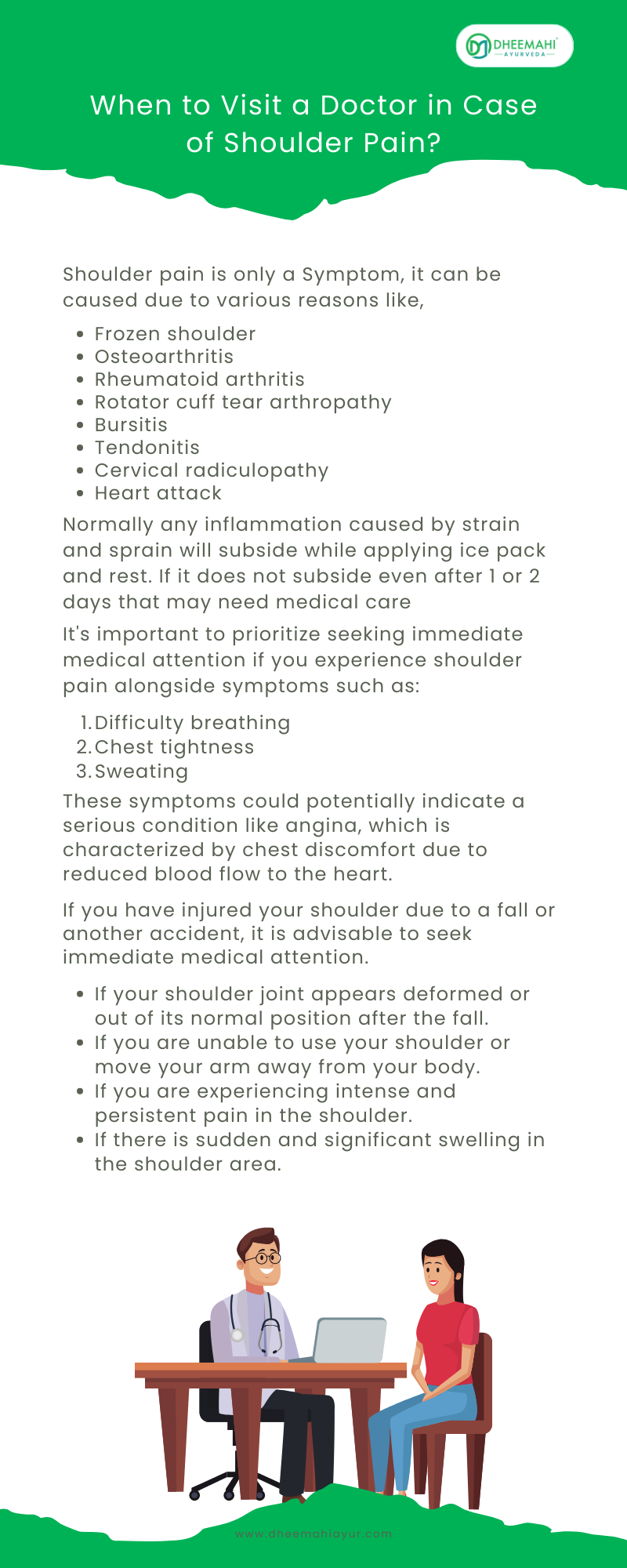Shoulder Arthritis and Frozen Shoulder: What’s the Difference?
Dr.Ajay Krishna P B.A.M.S
Your shoulder is a complex structure composed of three main bones:
- Upper Arm Bone (Humerus): This is the long bone in your upper arm.
- Shoulder Blade (Scapula): The shoulder blade is a flat, triangular bone situated in your upper back, and it plays a crucial role in your shoulder’s movement.
- Collarbone (Clavicle): The collarbone is a slender bone that connects your breastbone (sternum) to your shoulder blade.
The upper arm bone fits into a rounded socket located in the shoulder blade, and this socket is known as the glenoid. The shoulder’s stability and movement are maintained by a combination of muscles and tendons, collectively referred to as the rotator cuff. So Shoulder arthritis and frozen shoulder are conditions that affect the Shoulder joint.
People sometimes get confused between frozen shoulder and shoulder arthritis, but it’s important to know that these are two different things.
Shoulder Arthritis
- Cause: Shoulder arthritis is primarily caused by the wear and tear of the shoulder joint over time. It can also result from injuries or underlying medical conditions such as,
- Osteoarthritis
- Rheumatoid arthritis
- Rotator cuff tear arthropathy
- Symptoms: The main symptoms of shoulder arthritis are pain, stiffness, and reduced range of motion in the shoulder joint. This pain is often felt deep in the shoulder and may worsen with movement.
- Movement: While movement is limited due to pain and stiffness, there is no complete loss of motion in shoulder arthritis. Some movement is still possible, although it’s often uncomfortable.
Frozen Shoulder (Adhesive Capsulitis)
- Cause: The exact cause of a frozen shoulder is not always clear, but it often occurs due to inflammation and the tightening of the shoulder joint’s capsule. It can be associated with underlying conditions like diabetes.
- Symptoms: Frozen shoulder is characterized by severe pain, extreme stiffness, and significantly limited range of motion in the shoulder. It typically progresses through stages of increasing pain and decreasing mobility.Usually, the signs and symptoms start slowly and then worsen over time. However, the good thing is that these symptoms tend to improve, typically within 1 to 3 years.
- Movement: The hallmark of frozen shoulder is a substantial loss of shoulder movement. In some cases, patients may have difficulty even with everyday tasks like combing their hair or reaching for objects.
When to Visit a Doctor in Case of Shoulder Pain?
Shoulder pain is only a Symptom, it can be caused due to various reasons like,
- Frozen shoulder
- Osteoarthritis
- Rheumatoid arthritis
- Rotator cuff tear arthropathy
- Bursitis
- Tendonitis
- Cervical radiculopathy
- Heart attack
Normally any inflammation caused by strain and sprain will subside while applying ice pack and rest. If it does not subside even after 1 or 2 days that may need medical care
It’s important to prioritize seeking immediate medical attention if you experience shoulder pain alongside symptoms such as:
- Difficulty breathing
- Chest tightness
- Sweating
These symptoms could potentially indicate a serious condition like angina, which is characterized by chest discomfort due to reduced blood flow to the heart.If you have injured your shoulder due to a fall or another accident, it is advisable to seek immediate medical attention.
- If your shoulder joint appears deformed or out of its normal position after the fall.
- If you are unable to use your shoulder or move your arm away from your body.
- If you are experiencing intense and persistent pain in the shoulder.
- If there is sudden and significant swelling in the shoulder area.
Get a free online medical consultation with an expert doctor, before booking
The unique approach involves a series of discussion during your initial decision-making process to make sure that we will be able to match your expectations with our treatment. Based on the discussions with you our team of expert doctors will design the best treatment package personalized for your needs.
How our booking process works
1
Medical Questionnaire
Fill our Medical Questionnaire, after that we will get back to you via email/phone.
Discussion with Doctor
Discuss your health condition and expectations with our doctor.
3
Important Information
Carefully read all the important information.
4
Reservation
Confirm the booking by making a payment of 50% advance.
Dheemahi Ayurveda centre is recognized by Government of Kerala
The medicines we use comes from our own GMP certified herbal pharmacy.
One of the best ayurvedic hospital in kerala for classical panchakarma treatment
Daily yoga sessions of an expert yoga guru
All our attendants and therapists are certified as well as given in-house training by our Doctors to learn our way of therapies
In-house kitchen team serves the best authentic, healthy and fresh ayurvedic food
We offer you the best ayurvedic wellness centre experience
In house training sessions led by doctors on ayurveda lifestyle
Ready to Make a
Dheemahi Ayurvedic Village, Kumarakom, Kottayam, Kerala, India, Pin 6860000
Dheemahi Ayurvedic Centre, Near Neelimangalam Bridge, Kumaranaloor, Perumbaikad.P.O, Kottayam, Kerala, India, Pin 686016
Call Us Anytime: +91 80 4717 2727
Best Ayurvedic Diabetes Treatment in Kerala
Best Ayurvedic Obesity Treatment In Kerala
Best Ayurvedic Infertility Treatment in Kerala
Best PCOD Ayurvedic Treatment in Kerala
Best Ayurvedic Psoriasis Treatment in Kerala
Best Ayurvedic Insomnia Treatment in Kerala
Ayurvedic Pregnancy Care Treatment in Kerala

